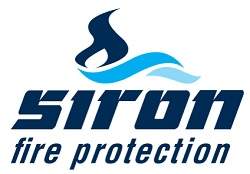Offshore Oil and Gas is a very demanding industry, both for the structures and for the personnel working there. SIRON Fire Protection recently replaced the sprinkler system in the crew accommodation module on a gas platform in the North Sea and opted to use CuNiFe (copper-nickel-iron alloy), which is resistant to corrosion even if seawater is involved.
There are several reasons why this choice of press fitting type materials was ideal.
The extreme conditions on an offshore platform make high demands on the materials used. Corrosion resistance is a prerequisite.
A drilling platform on the open sea is particularly hard to deal with 365 days a year, particularly due to the influence of seawater and harsh weather conditions. Salt water has a huge impact on all materials.
SIRON Deluge Services CEO Antoon Buitenhuis said: “After more than 20 years, the original design life of the materials used during installation has been surpassed and many parts have to be replaced.”
Carbon steel
The original pipes on the platform were made of carbon steel, but that material no longer meets current safety requirements.
In principle, the pipes of the extinguishing system are filled with fresh water. That water is pumped up, and by means of valves, the salt and the fresh water are separated. However, over the years the fresh water becomes increasingly salty, which is why it is preferable to opt for a corrosion-resistant material that can withstand salt water.
Titanium

In addition to using CuNi material for the piping, SIRON Fire Protection improved the material choice of the sprinkler heads. Titanium sprinkler heads were installed in the original system.
The traditional method of pipework installation is welding pipes, but that has major disadvantages in terms of work speed and noise.
With press fittings, you do not have to weld because all kinds of elbows and corners can be quickly and easily installed on site.
The life and especially sleep rhythm of the personnel on board must also be considered. Every drilling platform is built as compact as possible. This means, among other things, that the sleeping quarters for the people who work on the platform are optimally organised and occupied.
Buitenhuis said: “Major maintenance of the sprinkler system must, therefore, be completed in the shortest possible time and it is crucial that the people working on the platform do not get inconvenienced by it. We adapt to the platform and not the other way around, that is the difference with our working method. The people on the platform notice that we are there, but they are not bothered by it. Speed of work is a requirement, and this is made possible with a press fitting system. The tool is pressed, making hardly any noise, and that is a big advantage in this respect.
“But even then it requires careful planning because we must consider people’s sleep times. In practice, it means that we can install the pipes in one cabin and then go to a cabin further on. Only when it comes out of each cabin are the pipes connected to each other. ”
The work is often carried out in small, tightly spaced corners and invariably above the ceiling. Light tools are much easier to work with and press fittings are the most suitable choice for a simpler installation.
Due to safety requirements, the sprinkler system must never be switched off or isolated.
The new sprinkler system was installed next to the old system, and only after the complete system was installed and brought online was the old system removed.
Buitenhuis added: “The system should not be offline for a moment. That is also a tough requirement.”
The team who install the system run along with the existing pipework on the drilling platform and must be able to work as efficiently as possible. On behalf of SIRON Fire Protection, two men worked on the platform that participated in the rotation schedule. That means a schedule of two weeks on, two weeks off, and shifts of twelve hours a day followed by twelve hours of rest during the fourteen-day period.
Buitenhuis stated: “Normally, work such as this is carried out under a major maintenance shutdown. A platform is shut down for some time to carry out all the work that is required, but here the system did not have to be isolated, and that is a big advantage for an oil company because it will not see production loss or affect ongoing operations.”
“With this platform, we were fortunate that the piping system was well designed. That is not always the case. This is work that can only be carried out by specialised installers. They must be extremely flexible because it is only when the ceiling is open that you can see how and where the pipes really run. We work with only a handful of highly qualified installers who know very well what is expected of them and who have a lot of experience in this. They also have extensive experience with press type fittings, which is also important. “

